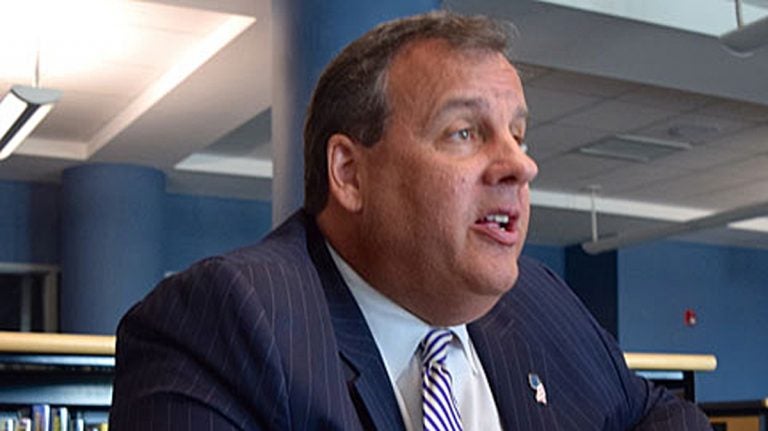Q&A with Gov Christie on how his school funding formula would work

Governor Chris Christie said this week that NJ's progressive approach to school funding should be abandoned.
Gov. Chris Christie’s plan this week to dismantle New Jersey’s school-funding formula and replace it with a uniform allotment to every district — regardless of wealth or poverty — has drawn far more questions than answers.
Will this only harm urban districts and, in turn, their children? What about charter schools in these same districts? Conversely, is this what suburban schools really want?
NJ Spotlight’s John Mooney was one of three reporters on Wednesday to sit down with the governor for nearly a half-hour to talk about his plan, following his presentation at Hillsborough High School.
Here are excerpts of that conversation
NJ Spotlight: How are you going to go about doing this?
Christie: The Legislature needs to answer for this. They seem to want to amend the constitution at a moment’s notice. Well, this is the single most-important issue to an overwhelming majority of New Jersey, so if we are going to start amending the constitution, let’s get to it on the issue people care about the most … If they put this on the ballot, I believe it would pass with 80 to 85 percent of the vote in a gubernatorial election year.
NJS: Is this replacing the New Jersey constitution’s “thorough and efficient” clause?
C: This would add an amendment that every child deserves equal funding in state aid. You can always go above that, as that’s a floor, so for special-needs kids and special education, that is backed out of this. We spend about $170 million on special education, and you’ll note that’s not in this. There will be certain special-education students who need more, and the state will continue to provide more. This is floor, not a ceiling.
NJS: No additional aid for kids who come from disadvantaged backgrounds? Limited-English students? That’s the whole foundation of the existing law.
C: The whole foundation of Abbott v Burke was the inequity in funding between suburban-rural districts and urban districts, and that has not only been eliminated but obliterated in the other direction. So the underpinnings of Abbott no longer exist. You can always deal with special-needs kids, but I do not believe that just your ZIP code is a special need, and we know in looking at charter schools, they are educating those children with special needs, and they’re doing it at a much better success rate than traditional public schools and at a better cost.
Q: Asbury Park now gets $30,000 per student a year from the state. Reducing it to $6,500, how is this going to help urban kids? (Questions marked with a “Q” are not from NJ Spotlight.)
C: They will be forced to make different decisions. Right now, they are on auto pilot. Right now, they get a big check from the state every year, and they are not making any changes in how they educate children, and they are not showing any increase in success. So, as I said in the speech, necessity is the mother of invention.
NJS: There is going to be significant cuts, including in state-run districts that you have invested a lot into. Will Chris Cerf [the Newark superintendent appointed by Christie] want to see his aid cut to $6,000 a kid?
C: Chris Cerf is a guy who believes education needs to be reformed, and I think Chris will adjust to whatever happens. They should be closing schools in Newark, and I’ve told Chris that … Chris has done a great job in terms of reducing the central office budget, but we need to be closing schools. We have too many schools and too many teachers for the number of students we have in Newark. The idea they are getting $750 million a year to educate the number of students they have, it’s an incredible amount of money.
NJS: What about the cuts? These aren’t adjustments, these are significant cuts.
C: It is not like there won’t be a classroom or a seat to sit in. The fact is they are far too large. But secondly, we only think about that end. What’s happened to all these other communities that are spending at the state average? Look at Ridgewood, it is spending at the state average, yet it only gets about $600,000 in aid and all the rest comes from the local taxpayer. They have had to make adjustments in their lives, too … Let’s not just talk about adjustments on one side, there have been 30 years of adjustments but 75 percent of the people in the state that we ignore.
I’m convinced after six and half years as governor that this is the only way to reduce property taxes, the only way.
NJS: Would this hurt charter schools in these districts as well?
C: I’m open to talking to charters about a “pay for success” model. If you kept the charter law as it is now, you would have to go to a new way of funding charters. It couldn’t be tied — and it shouldn’t be tied — to funding a percentage of a district’s funding … It would have to change.
We would have to go back to a way of funding charter schools that is not tied to what a district gets.
NJS: Democrats are going to say this is pie in the sky, it’s not going anywhere.
C: They can say that, but when I go to Fair Lawn and say that they will get an 800 percent aid increase, I assume (Democratic state Sen.) Bob Gordon is going to have to answer. . . The Democratic party has a very suburban base as well, and they have to answer to not serving those suburban constituents, while their property taxes go through the roof because they are unwilling to confront the failure of urban districts and the inequity of this funding.
NJS: You really don’t think urban kids will get hurt by this?
C: I don’t think they’ll be hurt. I think they are being hurt right now under this system. How can you say they’re not?
NJS: But this is clearly going to cut services to them?
C: It is not going to cut services. It is going to downsize those districts to an appropriate size, and stop the waste.
Q: The hurdle is you are going to have to get this through the Legislature.
C: That’s the biggest hurdle, but that is how political movements start … Nobody thought we would do a 2 percent property-tax cap, and we did it. Everybody thought I was crazy — they said pie in the sky — when I did pension and health reform in 2011. It got done.
Q: Has there been any discussions with Steve Sweeney or other Democrats in the Legislature? What do you say to Sweeney’s separate proposal to create a commission to recommend changes to the existing formula?
C: I don’t think it’s bad, but it’s too small. To say you will have a commission to move $800 million around (in certain aid) in a $9.1 billion aid package, it is not going to solve the property tax problem … We’re talking about a monumental change that needs to be made from a property-tax perspective and an educational perspective.
_________________________________________
NJ Spotlight, an independent online news service on issues critical to New Jersey, makes its in-depth reporting available to NewsWorks.
WHYY is your source for fact-based, in-depth journalism and information. As a nonprofit organization, we rely on financial support from readers like you. Please give today.




